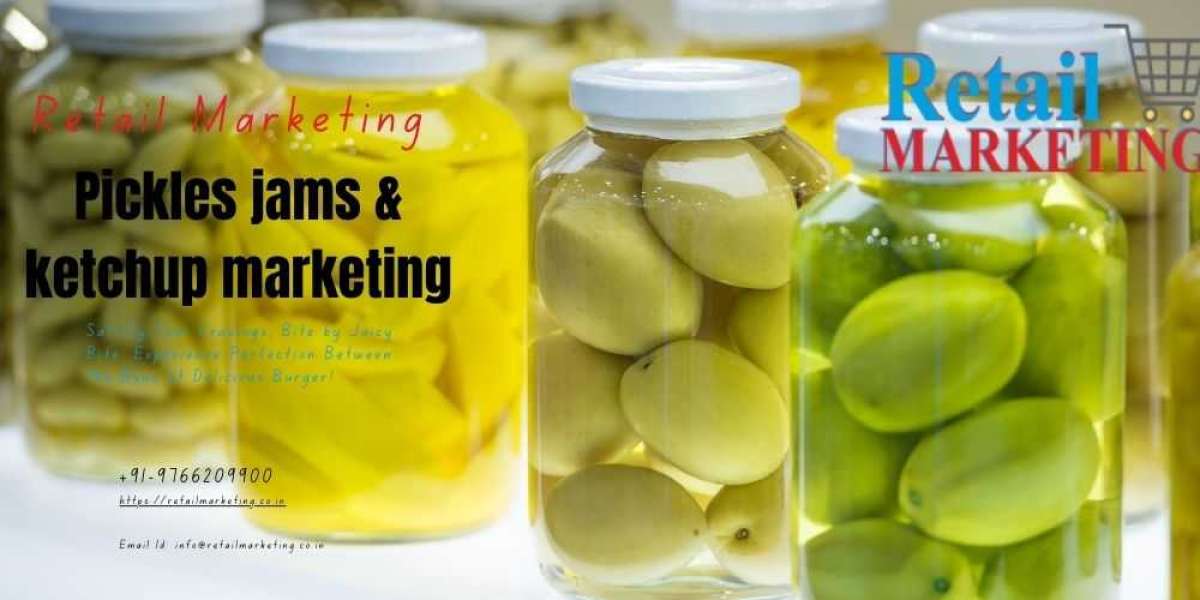Retail Marketing for Pickles, Jams, and Ketchups
Retail marketing for pickles, jams, and ketchups involves creating and executing strategies that attract customers, differentiate brands, and boost sales. These condiment categories play an integral role in daily meals, offering flavor enhancements and versatility. The marketing strategies for these products hinge on product innovation, attractive packaging, pricing, placement, and effective promotional campaigns.
1. Product Differentiation
- Pickles: The pickle category is diverse, with regional flavors, spice levels, and preparation styles. Differentiation can be achieved through innovative flavor profiles (e.g., sweet and spicy, garlic dill, or exotic options like mango or kimchi-inspired pickles), organic or preservative-free options, and unique preparation methods like small-batch or artisanal pickling. Health-conscious consumers are drawn to low-sodium, fermented, or probiotic-rich pickles, while snack-sized packaging appeals to on-the-go consumers.
- Jams: Jams are marketed based on their fruit content, sweetness level, and texture (chunky, smooth, or jelly-like). Premium jams emphasize all-natural ingredients, high fruit content, and organic certifications. Creative flavor combinations (e.g., raspberry-lavender, mango-habanero) and low-sugar or sugar-free options cater to health-conscious or adventurous eaters.
- Ketchups: Traditional ketchup is a household staple, but differentiation can be achieved through unique recipes like spicy, smoky, or tangy variations. Specialty ketchups that incorporate ingredients like chipotle, truffle, or even beetroot attract gourmet food lovers. Health-conscious consumers are drawn to ketchups with reduced sugar, no artificial preservatives, or added vitamins.
2. Point-of-Sale (POS) Strategies for Pickles Jams and Ketchups Marketing:
- Pickles: POS displays for pickles should highlight their versatility as a condiment, ingredient, or snack. End-cap displays, sampling stations, or pairing suggestions (e.g., pickles with burgers or sandwiches) can boost impulse purchases. Displaying them near complementary items like sandwich bread, deli meats, or grilling essentials creates cross-selling opportunities.
- Jams: Placing jams near breakfast-related items such as bread, bagels, or cereals can increase visibility and encourage bundling. POS displays that showcase their use in recipes or desserts can inspire new uses. Creative shelf arrangements highlighting premium and exotic flavors attract consumers looking for indulgent options.
- Ketchups: Ketchups benefit from placement in high-traffic areas or near other condiments like mustard and mayonnaise. POS strategies can include themed displays during grilling season or promotional packs paired with chips or frozen fries. Cold case displays near ready-to-cook snacks also drive convenience-focused purchases.
3. Pricing Strategies
- Pickles: The pickle market spans a range of price points. Mass-market pickles use competitive pricing, while gourmet or artisanal pickles justify higher prices with claims of superior quality, unique flavors, or traditional preparation methods. Family-size jars and multi-packs cater to budget-conscious shoppers.
- Jams: Pricing strategies for jams depend on the target market. Premium brands emphasize quality ingredients and small-batch production to justify a higher price. Mainstream brands often rely on promotional pricing, such as discounts or bundle deals, to compete on value.
- Ketchups: Ketchups are often competitively priced, with brands offering bulk packaging for families or smaller, single-serve options for convenience. Limited-edition or gourmet ketchups may command premium pricing. Promotions like "buy one, get one free" or loyalty card discounts are common tactics.
4. Promotional Activities
- Pickles: Sampling programs allow consumers to experience new flavors firsthand, which can encourage trial. Social media campaigns featuring creative uses of pickles (e.g., pickle wraps, fried pickles) can inspire curiosity and engagement. Partnerships with food bloggers or chefs help boost credibility and visibility.
- Jams: For jams, promotions can focus on their versatility, highlighting usage in breakfast, baking, or as a topping for desserts. In-store tastings, recipe cards, and online video tutorials are effective promotional tools. Seasonal campaigns featuring limited-edition flavors (e.g., holiday-inspired jams) can create excitement.
- Ketchups: Ketchup promotions often tie into events like barbecue season or major sports games, emphasizing their role as a party or meal essential. Interactive social media campaigns, contests (e.g., "best burger recipe featuring our ketchup"), and celebrity endorsements can generate buzz. QR codes on packaging leading to recipes or pairing ideas also enhance engagement.
5. Packaging and Branding
- Pickles: Clear glass jars showcasing the vibrant colors and textures of pickles appeal to consumers. Eco-friendly packaging options, resealable lids, or snack-sized containers add convenience and sustainability.
- Jams: Elegant glass jars with simple, artisanal labels work well for premium jams, while bright, bold designs appeal to families. Smaller jars for single servings or sample packs encourage trial and appeal to variety seekers.
- Ketchups: Squeeze bottles are a practical choice for families, while glass bottles appeal to premium consumers. Eye-catching labels and packaging innovations, such as dual-flavor bottles, can attract attention.
6. Seasonal and Cultural Targeting
- Pickles: Seasonal campaigns around summer barbecues or festive occasions highlight their relevance in different meals.
- Jams: Highlighting jams during holiday seasons as gifts or part of breakfast gift baskets increases sales.
- Ketchups: Seasonal promotions tied to events like outdoor grilling or national celebrations emphasize their must-have status.
Through strategic retail marketing, brands in the Pickles Jams Ketchups Marketing categories can effectively appeal to consumers, encourage trial, and foster brand loyalty. By focusing on differentiation, strategic placement, competitive pricing, and engaging promotions, brands can stand out in a competitive market.














